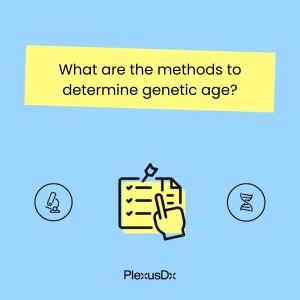

This episode is proudly sponsored by PlexusDx - your trusted partner in precision health. Discover the power of personalized wellness with our Longevity and Biological Age Genetic Test and over 25 cutting-edge health and wellness genetic tests designed to help you optimize your health. Visit PlexusDx.com to learn more. Now, let’s dive into today’s episode!
Welcome to our exploration of a fascinating topic: how to find your genetic age and what that really means for your health. You might be wondering, why do some people seem to age gracefully while others look older than their years? The answer could lie in your genes, and understanding your genetic age can provide important insights into your overall health and wellness.
So, what exactly is genetic age? It’s not just about the number of candles on your birthday cake. Your genetic age reflects the biological maturity of your cells, which can differ from your chronological age—the total years you’ve been alive. Essentially, while chronological age counts the years, genetic age evaluates your DNA, lifestyle, and environmental factors. This makes it a powerful measure of your health status.
How do we determine this elusive genetic age? The most effective method is through a methylation test. This test looks at specific DNA sequences that change as we age. Methylation is a natural process where methyl groups attach to DNA, influencing gene expression without altering the DNA sequence itself. Over time, these patterns can reveal a lot about your biological age. If your genetic age is higher than your chronological age, it might indicate a greater risk for age-related diseases. Conversely, a younger biological age could suggest healthier lifestyle choices or favorable genetic traits.
So, why should you care about your genetic age? Knowing it can empower you to take proactive steps toward better health management. Here are a few reasons why measuring your genetic age is important:
- Personalized Health Insights: Understanding your genetic age can help you create tailored health and wellness plans. If your genetic age is higher than expected, it might be time to consider some lifestyle changes.
- Early Detection of Health Risks: A methylation test can identify potential health issues before they develop, giving you a chance to act early.
- Motivation for Healthier Habits: Discovering your genetic age can serve as a wake-up call that encourages you to live your best life.
So, how do you actually find your genetic age? It’s simpler than you might think. Start by considering a methylation test. Companies like PlexusDx offer precision health and wellness tests that can help you determine your genetic age.
Before you dive in, it’s a good idea to consult with a healthcare provider. They can help you understand your test results and guide you on the next steps. Once you have your results, take some time to analyze them. Look for any discrepancies between your chronological and genetic ages. If your genetic age is higher, think about your lifestyle habits. Are you managing stress well? Getting enough exercise? These insights can help you make informed choices about your health.
If your results suggest you need to make some changes, here are a few tips: eat a balanced diet rich in whole foods, stay active with regular exercise, manage stress through activities like meditation, and prioritize quality sleep.
In conclusion, understanding your genetic age can be a powerful tool for guiding your health journey. A methylation test can provide valuable insights that help you make better lifestyle choices. If you’re ready to explore this further, check out the precision health and wellness tests from PlexusDx at PlexusDx.com, Amazon, and Walmart.com.
Thank you for joining us in this exploration of genetic age! If you found this information insightful, please like and subscribe for more health-related content. Remember, links to PlexusDx tests are provided below.
Ready to take control of your health with precision genetic insights? You can purchase the PlexusDx Longevity and Aging Genetic Test from these trusted retailers:
- 👉 PlexusDx – Order directly from our official website.
- 👉 Amazon – Convenient shopping with fast shipping.
- 👉 Walmart – Buy online from a trusted retailer.
Get your personalized DNA insights today and start optimizing your health! 🚀
More Episodes
All Episodes>>You may also like
Create Your Podcast In Minutes
- Full-featured podcast site
- Unlimited storage and bandwidth
- Comprehensive podcast stats
- Distribute to Apple Podcasts, Spotify, and more
- Make money with your podcast












